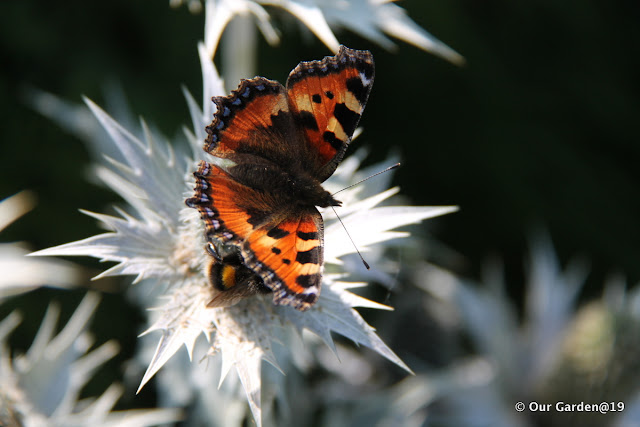...Oh how happy they seem to be.
A Small Tortoiseshell butterfly landing on a Eryngium Giganteum in the sunny front garden...
...is then joined by a bumble bee ...
...I think it is a Buff Tailed...
...both busily feeding on the nectar in the sunshine.
Take off........Eryngium Giganteum is one of my favourite self seeding garden plants...
...it is a biennial, the seed leaves bearing no resemblance to the mature ones.
...and then silvery blue Erygium Gigantium...
...commonly called 'Miss Willmotts Ghost' after the famous Edwardian Gardener who so loved the plant she use to scatter seeds when visiting other gardens.
To read more about Miss Willmott please visit Chloris Here
I think it is a plant who's life cycle is similar to the butterfly, the different stages of growth give no indication of the beauty to come.
Please click on any picture to create a slide show.










Super photos. I love Eryngiums too. My current favourite is Eryngium bourgatii '' Picos Blue' which is the bluest of blues.
ReplyDeleteThanks for the mention.
I agree with you E. bourgatii "Picos Blue" is a wonderful colour. I once tried unsuccessfully growing it from seed.
DeleteFab photos Brian. The Eryngium leaves always surprise me. How does something that looks so succulent end up so spiky? The first year I grew them, I pulled up most of the seedlings as I thought they were weeds. Luckily my weeding is rather poor, so there were plenty still growing and eventually I made the connection.
ReplyDeleteThank you Anne, it is amazing the change in the plant during its development.
DeleteOh no!!!! Now I know why my lovely Eringium hasn't appeared this year. I wasn't aware of the huge difference between the seed leaf and the final spiky one . . . I pulled up every one early this year, thinking I was clearing the ground of weeds in my already crammed garden borders. So sad because it was a particularly attractive plant but I don't know the variety name.. I shall have to go get some seeds for next year and hope they grow into another lovely plant.
ReplyDeleteChiltern seeds have a good range of Eringium in their catalogue. They do have a website.
DeleteJust beautiful - I don't think of Eryngium with butterflies and bees, but it looks perfect...! I had hoped to find that I could grow it here, but sadly it appears to be something of a long shot due to the heat. I hadn't realized just how much greyer Miss Wilmott's Ghost is.
ReplyDeleteI agree Amy, it is not the sort of plant you would associate with producing nectar, perhaps it is due to its spiky appearance. The pollinators all seem to enjoy visiting it.
DeleteI too fell foul to the misunderstanding of the seedling leaves in the past. Your post has made me realise why I was unsuccessful. This is a nice plant. They are striking aren't they Brian?
ReplyDeleteI have E. bourgatii Graham Stuart Thomas growing in the front garden which will need moving come autumn and they are just coming into flower. Like you I've found the bees and butterflies love it.
I would save some seed Angie, in my experience they don't move very well.
DeleteThat was really interesting. I didn't know that about the leaves. I do have one variety in the garden, so I might try collecting some seeds this year.
ReplyDeleteThey usually germinate ok Annette, especially in gravel.
Delete